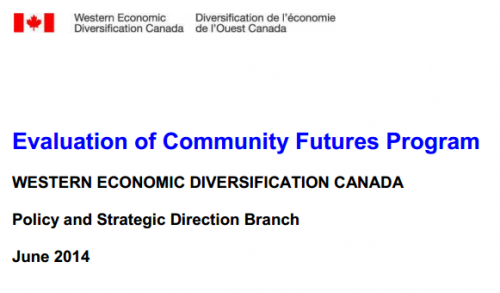The Community Futures Program (CFP) supports Community Economic Development (CED) and builds the self-reliance and capacity of communities to realize their full sustainable potential. The objectives of the CFP in support of this mandate include fostering economic stability, growth and job creation; helping to create diversified and competitive local rural economies; and helping to build economically sustainable communities. The CFP is delivered through four Regional Development Agencies in their respective regions. The CFP is designed to operate in rural communities and provides financial support to Community Future Organizations (CFs) for their activities. There are 90 non-profit CFs, 4 provincial CF Associations and one Community Futures Pan West Group in Western Canada.
CF activities include (1) fostering strategic community planning and socio-economic development; (2) providing business services by delivering a range of business, counselling and information services to small and medium-sized enterprises (SMEs) and Social Enterprises; (3) providing access to capital to assist new and existing SMEs and social enterprises; and (4) supporting communitybased projects and special initiatives.
This study evaluates the relevance and performance of the CFP from 2008–09 and to 2012–13. In order to minimise duplication of effort, the evaluation draws upon findings in the CFP revitalization exercise to support some of the issues in the evaluation framework. The evaluation serves as a complement to the broader revitalization initiative.
The methodology for the evaluation included document and literature review, performance data analysis, Statistics Canada business number review, 2011 Statistics Canada census data of CF service areas, key informant interviews, surveys and case studies.
RECOMMENDATIONS
Based on the findings and conclusions drawn from the evaluation, the following recommendations are made to be addressed by the department.
- Recommendation 1: The department should clarify CF activities that count as community economic development
- Recommendation 2: The department should examine the effectiveness of the CF reporting system to report on outcomes and ensure better integration with departmental systems.
- Recommendation 3: The department should continue to work with other Regional Development Agencies on enhancing analysis of long-term outcomes using Statistics Canada data runs. The department may want to explore using this method of assessing long-term outcomes for other departmental programs.
Download the report
Table of Contents:
EXECUTIVE SUMMARY
SECTION 1: INTRODUCTION
1.1 BACKGROUND OF THE COMMUNITY FUTURES PROGRAM
1.2 SCOPE AND OBJECTIVES OF THE EVALUATION
SECTION 2: EVALUATION METHODOLOGY
2.1 EVALUATION LOGIC MODEL AND FRAMEWORK
2.2 EVALUATION APPROACH AND METHODOLOGY
2.3 EVALUATION CHALLENGES AND LIMITATIONS
SECTION 3: RELEVANCE OF THE PROGRAM
3.1 CONTINUED NEED FOR THE PROGRAM
3.2 ALIGNMENT WITH DEPARTMENTAL AND FEDERAL GOVERNMENT PRIORITIES
3.3 CONSISTENCY WITH FEDERAL ROLES AND RESPONSIBILITIES
SECTION 4: PERFORMANCE: ACHIEVEMENT OF EXPECTED OUTCOMES
4.1 INCREMENTALITY
4.2 OUTPUTS AND IMMEDIATE OUTCOMES
4.3 INTERMEDIATE OUTCOMES
4.4 ULTIMATE OUTCOMES
4.5 CONTRIBUTING AND CONSTRAINING FACTORS TO SUCCESS
4.6 PERFORMANCE MEASUREMENT
SECTION 5: PERFORMANCE: EFFICIENCY AND ECONOMY
5.1 EFFICIENCY AND ECONOMY OF THE CFP
SECTION 6: CONCLUSIONS AND RECOMMENDATIONS





